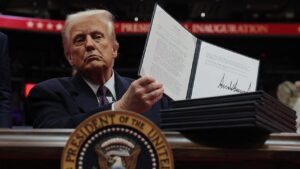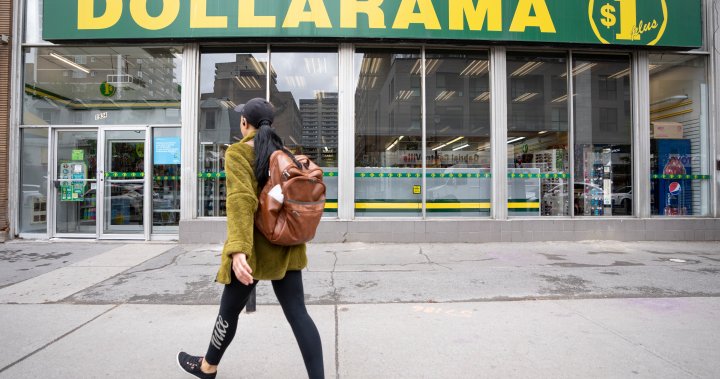U.S. President Donald Trump’s threats to impose tariffs on imports from China could send shockwaves through global supply chains that experts warn could raise prices on everything from big-ticket household goods to dollar store purchases in Canada.
Since Trump’s re-election in November, Canadian officials have been largely focused on a response to his threats to impose sweeping tariffs of 25 per cent on all goods entering the country from Canada and Mexico.
After entering office earlier this week, Trump updated his deadline for imposing tariffs to Feb. 1.
Experts have warned a slew of goods from orange juice to cosmetics could get more expensive if Canada and the U.S. exchange tit-for-tat tariffs.
But North America isn’t Trump’s only target: the president also threatened to impose 10 per cent tariffs on all goods entering the U.S. from China on the same date. Previously, he’s threatened even loftier tariffs of up to 60 per cent on Chinese imports.
While economists have warned of serious damage to economies on both sides of the border if Canada and the U.S. waded into a tariff war, the cost of Chinese tariffs could also be steep for consumers.
“It’s a very complex situation. It’s like an ecosystem, right? If the U.S. puts massive tariffs … on China, you’re probably going to see it affect Canada,” retail analyst and author Bruce Winder told Global News.
A tariff is a charge levied by a government on an import into the country. It’s paid directly by the importing company but can result in higher prices for end consumers if the business raises prices to offset the cost of the tariff or shifts its supply routes to a more expensive alternative.
Winder warns that both situations would be in play in the case of tariffs on China.

Get weekly money news
Get expert insights, Q&A on markets, housing, inflation, and personal finance information delivered to you every Saturday.
Many American manufacturers selling to Canada also rely on Chinese inputs before their final products are sold to customers north of the border. This is most common for high-ticket, bulkier items that don’t ship well overseas, Winder says, like motor vehicles or furniture.
But he gives the example of a bicycle: if a wheel or a gear is shipped from China to an American maker, who then pays the imposed tariff, the cost of that part will be baked into the final price paid by a consumer buying the bike in Toronto.
If Chinese exporters meanwhile see their business in the U.S. dry up because of the proposed tariffs, that could have a knock-on effect for their customers elsewhere in the world.
Winder says that’s because U.S. buyers do such a high volume of sales for Chinese exporters that it essentially “subsidizes” those products selling into other markets. Without that business, manufacturers in China may have to raise prices on their goods sold to Canada or Europe to make up the losses, he says.
“There’s literally thousands, if not millions, of manufacturers in China who count on the U.S. market to ship their products to. So it could significantly change the economics of the export market of China depending on how high the tariffs are and how long they last,” Winder says.
Chinese products make up or are a part of a number of goods Canadians buy.
In an interview earlier this week, personal finance expert Rubina Ahmed-Haq pointed to dollar stores as being particularly vulnerable to Chinese tariffs. While discount stores became a haven for many Canadians struggling with the cost of living over recent years, she warned that some of those savings on many goods shipped from overseas will be at risk.
“When you go to places like the dollar store or the discount stores, you may not see as many items as cheap because those items are now going to be pricing in those new tariffs that the U.S. government’s put on them,” she said.
A Dollarama spokesperson told Global News on Wednesday that overseas imports accounted for just under half of the company’s procured inventory in the last fiscal year, with the bulk of that coming from China. The remainder came from North American vendors.
“That said, we are actively monitoring the situation, and should there be any indirect impact, we expect such impact would affect all Canadian retailers with whom we compete. Our focus, as always, will continue to be on offering the best relative value on the market,” the spokesperson said.
Winder agreed that any retailer that sells durable “hardline” products like appliances, toys or household goods are likely to face price pressures if Chinese trade were disrupted. Softer goods such as clothing have supply chains that are more widely diversified and less likely to be hit by tariffs on China, he said.
Global News reached out to Canadian retailers including Aritzia, Lululemon and Canadian Tire to ask about how they expect possible Chinese tariffs to impact their sales. None responded before the deadline.
Major online retailers such as Temu and Shein also have supply chains firmly entrenched in China. Global News reached out to both companies to ask whether they expected price pressures from Trump’s proposed tariffs, but neither responded before the deadline.
Both Winder and Ahmed-Haq note that the trade uncertainty around Trump’s protectionist policies have hammered the Canadian dollar in recent weeks, which will in turn make any imports into Canada more expensive until the loonie recovers.
Winder said that many countries have been diversifying their production outside of China in recent years to neighbouring countries such as Vietnam, Cambodia, Thailand or India, which can help them mitigate the impact of possible U.S. tariffs.
But he warned that these shifts are years-long processes, and any company looking to make a supply chain shift today to get out ahead of the latest round of trade disputes will be too late. And even if an importer is able to get a factory running in Vietnam or Cambodia, the costs of manufacturing in less-established hubs could offset the price hit from the possible Chinese tariffs.
“Over the last 40 years, China has become the workshop of the world. So they have the best prices. They have all the infrastructure, the mammoth factories, and a lot of countries don’t. So it’s not something you can turn on a dime,” Winder says.
— with files from Global News’ Anne Gaviola
© 2025 Global News, a division of Corus Entertainment Inc.
Read the full article here

















